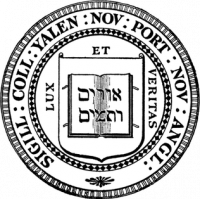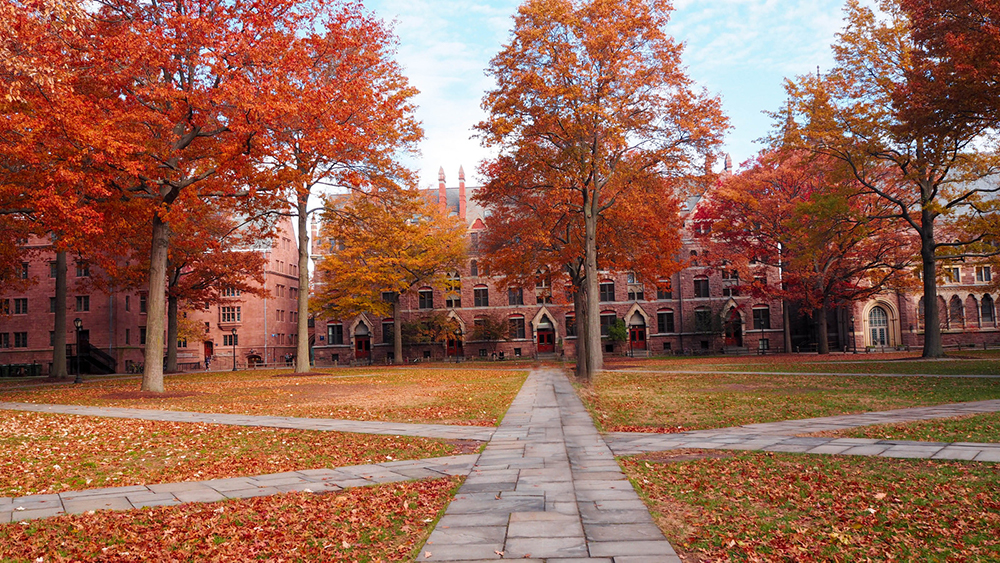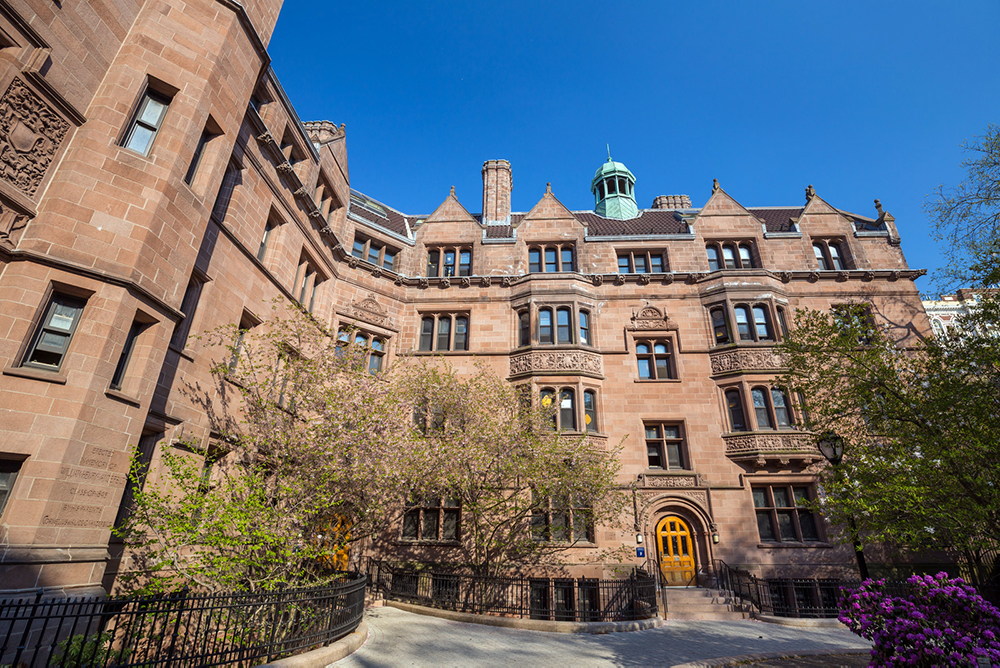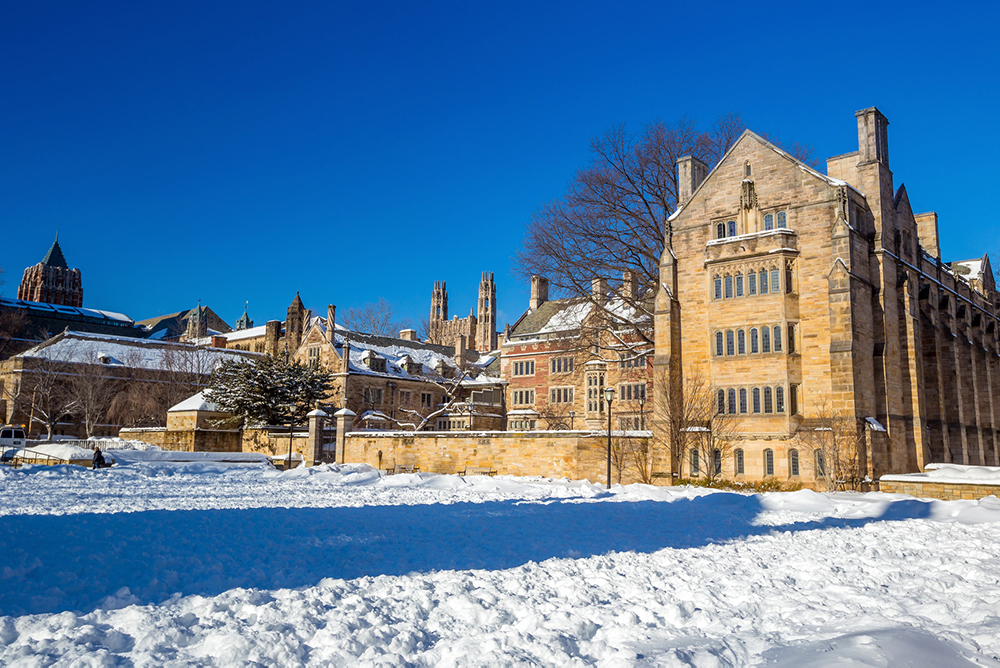The Ivy Scholars guide to Yale University’s culture, admissions, and other essential information for prospective students and their families.
Location: New Have, Connecticut
Mascot: Handsome Dan the Bulldog
Type: Private Research Institution
Population: 6,000 undergrads, 13,400 total

Yale University was founded in 1701 in New Haven, Connecticut and is the third oldest college in the United States. Yale awarded the first PhD in the country in 1861 and has a nearly equal number of undergraduates and graduates. The school is split into residential colleges, which operate a bit like the houses at Hogwarts and are assigned before students begin their freshman year.

Year Founded: 1701
4 Year Graduation Rate: 88%
Gender Distribution: 50% male, 50% male
Acceptance Rate: 7%
Residency: 80% out of state, 11% international, 9% in state
Location Type: Urban
Schedule System: Semesters
Student/Faculty Ratio: 6:1
Average Class Size: 18
Demographics: 44% Caucasian, 14% Asian, 9% Hispanic, 6% Black, 5% Other
US News Rankings:
Independent Rankings:
Application Deadlines:
Notification Dates:
Acceptance Rates:
Average Applicant Pool: 36,800
Average Number of Applicants Accepted: 2,200
Average Number Enrolled: 1,400
Application Systems: Common App, Coalition App
Average GPA: 4.19 weighted
SAT Scores: 25th percentile – 1420, 75th percentile – 1590
ACT Scores: 25th percentile – 32, 75th percentile – 35
*Test mandatory. Writing sections optional.
Demonstrated Interest: Yale does not consider demonstrated interest.
Recommendation Letter Policies:
Two letters of recommendation from teachers who have taught students in credit-bearing classes during the academic year in core academic subjects. (Preferred from Junior and Senior Year) One Counselor recommendation. Supplemental letters discouraged.
Yale Essay Prompts for 2021:
*For applicants submitting the Coalition Application:
Engineering Essay
Special Notes:
Transfers:
Enter your information below and submit for access to the guide.
Core Requirements:
Courses of Study:
AP Credit Policies:

Admissions Criteria:
The most important factors for Yale admissions are the essays, recommendations, course rigor, extracurriculars, GPA, standardized test score, and character. Yale wants students who are academically prepared, and who demonstrate this preparation by excelling in difficult courses. They further want passionate and involved students; who have demonstrated their passions and curiosity through their extracurricular activities.
Factors which are considered, but are of secondary importance are the interview, legacy status, first generation status, race/ethnicity, geographic origin, state residency, and work experience. None of these are enough on their own, but can serve as deciding factors between qualified candidates.
Yale is need-blind in admissions, which means a student’s ability to pay for college is not factored into the admissions decision.
What is Yale Looking For?
Yale wants students who will best be able to take advantage of and benefit from the resources they offer on campus. This is not just students who are the most academically prepared, but ones who are deeply intellectually curious with passions they want to pursue.
The first thing admissions looks at is academic preparation: a student’s transcript and test scores. This is the first bar which must be passed, as Yale seeks academic excellence and intellectual passion. While admissions will keep reading an application even if grades are sub-par, academics are a key factor.
The letters of recommendation provide context for a student’s grades; how they work and how they think. This combines with later sections of extracurriculars and essays to give admissions officers a better idea of who they are as a person beyond their scores alone. Here, they are looking for passion, academic curiosity, and a drive to learn for the sake of learning and knowledge alone.
All applications are read through in their entirety before being discussed by committee. While the various strengths of each file will be discussed, and each will be decided by committee, many will be dropped very quickly if initial readers don’t believe the applicants are suited for the college. First readers decide which applications deserve more in-depth review by the committee.
Yale is devoted to both keeping its high standing in the rankings, preserving their campus culture, and in increasing outreach to underserved and underprivileged communities. Thus the ideal student is high achieving, from an under-represented background, and fully embodies the culture of Yale, as portrayed in their essays.
Finally, Yale has a strong athletic tradition, and recruited athletes who meet their academic standards are in a very good position to gain admittance. It is rare for students to meet both criteria, however, and admissions hope should not be pinned on this.
Yale Strategy:
Yale is currently in the process of increasing their undergraduate population, although as with the rest of the elite schools in the country the number of students applying to the school is growing every year. Thus admission rates will slow their descent, and indeed the 6% admissions rate last year was an increase from the year before. That said, it is not a high rate by any means.
Yale does not track demonstrated interest; their yield is slightly above 70%, which means 70% of the students they admit decide to attend the school. However, the optional interview is a good opportunity to both learn more about Yale, and to give admissions another view of who you are as a person. This is important, because character is one of the key factors considered in admissions.
Yale does not offer Early Decision, but does offer Restrictive Early Action, which is a good option if Yale is your top choice. Applying this way prevents you from applying to other schools early, but doesn’t bind you to attend Yale if you are accepted. As the applicant pool is smaller, students have a slightly higher chance of being admitted applying this way.
Yale is known primarily as a liberal arts school, although they are trying to improve their reputation for STEM subjects, thus students who are moderately competitive for MIT or CalTech would actually be more competitive for Yale.
Students should do their best to have a singular passion or theme through their extracurriculars, as this makes it easier for first readers to remember their application, and present it to the committee. Students who stand out in their passion and involvement are more likely to be accepted, as they appear unique and interesting.
Honors Programs:
Research Availability:
Study Abroad:
Business Options:
Pre-Med Options:
Pre-Law Options:
Computer Science Options:
Additional Specialty Programs:
Programs for High Schoolers:

School Motto: Light and truth
Mission and Values:
Yale’s Residential College System:
Yale’s Residential College System has a blend of intimacy, as well as vastness. With 14 colleges available the variety is broad, however what they have in common is a “home away from home.” Each college contains a library, gym, dining hall, activity spaces, and centers around a grassy courtyard. Other interesting offerings may include a movie theatre, basketball court, printing press, as well as the Buttery in the basement of each college where there is a snack bar that sells cheap food late at night and often serves as a gathering place. Students are fiercely loyal to their colleges and each student feels the residential college they were placed in via lottery is the very best. Yale students have fun competitions between the colleges.
Housing Statistics:
Campus & Surrounding Area:
Transportation:
Traditions:
Student-Run Organizations:
Sports:
Greek Life:
Yale has an active greek life. They have four National Panhellenic sororities, two Latina-based multicultural sororities, eleven fraternities (one is Latino-based, multicultural Greek organization, and another of which is a Christian fraternity as well as one co-ed house.
Nightlife:

Yearly Cost of Attendance:
The Yale Initiative:
The Eli Whitney Students Program (EWSP) is designed for individuals with high academic potential who have had their education interrupted, at some point during their educational careers, for five or more years. The format of the program offers more flexibility and allows students to take classes on a part time basis. They can still qualify for need based financial aid.
Additional Financial Aid & Student Loan Information
Scholarships
Yale, like all other Ivies, does not offer merit-based scholarships. Often students qualify for merit awards from other organizations where the criteria will be linked to the student’s performance in academics, sports, music or another field of special interest. These outside scholarships can then be used to pay for attending Yale.

Ivy Scholars is the leading educational consultant in Sugar Land, Texas, providing admissions coaching, test prep, and more to help students enroll at top tier schools.

Call us now: +1 (281) 215-5148
.
Get expert tips, admissions updates, and resources delivered straight to your inbox.


